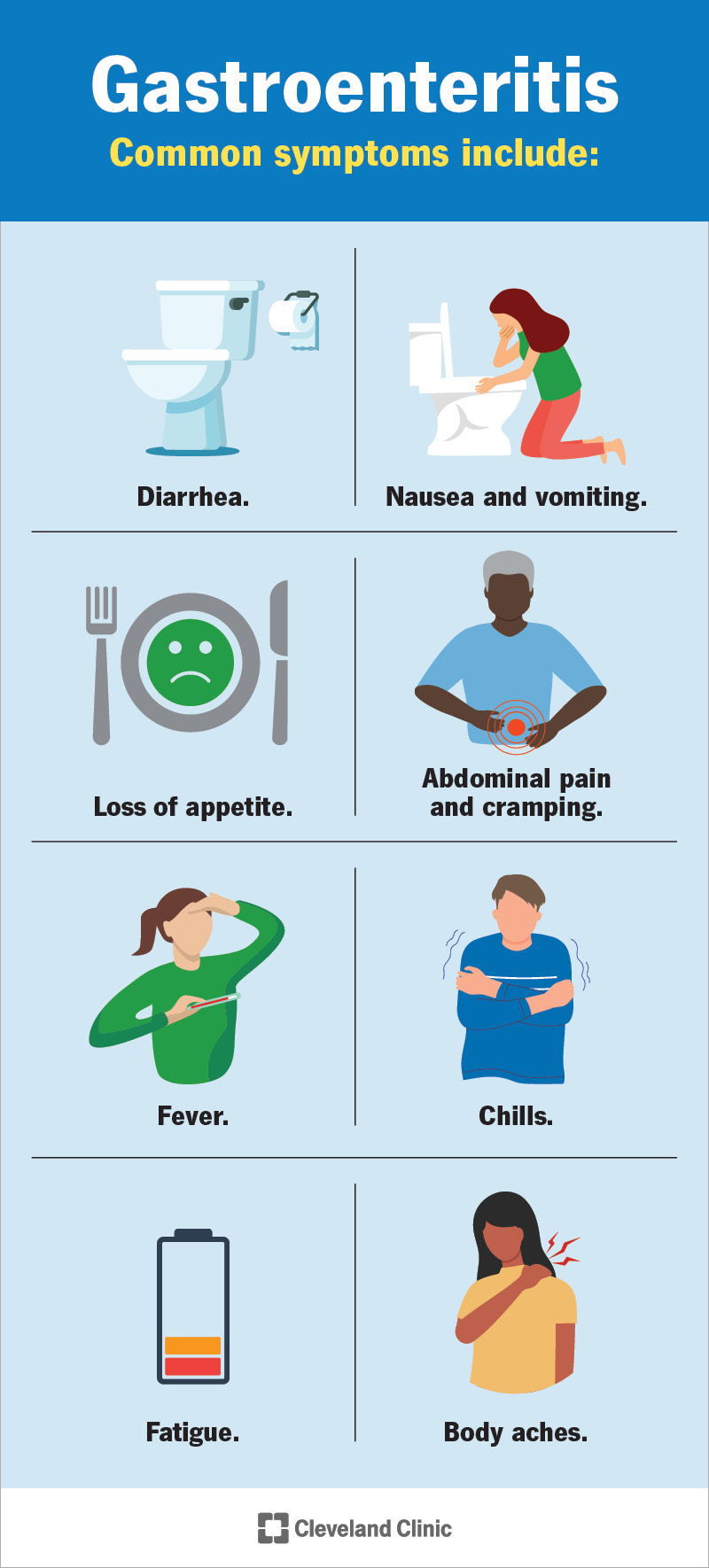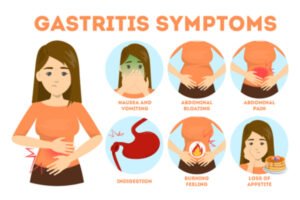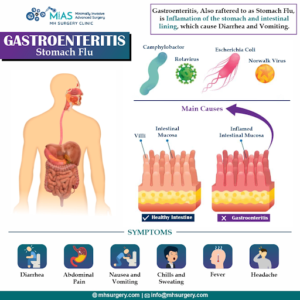Gastroenteritis, often referred to as stomach flu or gastric flu, is a common condition characterized by inflammation of the stomach and intestines. It can cause a range of uncomfortable symptoms, from nausea and vomiting to diarrhea and abdominal pain. Recognizing the key signs of gastroenteritis is essential for prompt diagnosis and appropriate management. Let’s explore these signs in detail, as found on wellhealthorganic.com.
What is Gastroenteritis?
Gastroenteritis is an inflammation of the gastrointestinal tract, primarily affecting the stomach and intestines. It is commonly caused by viral or bacterial infections, although parasites and toxins can also be responsible. Gastroenteritis can spread through contaminated food or water, close contact with infected individuals, or poor hygiene practices.
Key Signs and Symptoms:
- Nausea and Vomiting: One of the hallmark symptoms of gastroenteritis is nausea, often accompanied by vomiting. These symptoms may occur suddenly and persist for several hours or days. Vomiting can lead to dehydration, especially in young children and older adults, if fluids are not replaced adequately.
- Diarrhea: Gastroenteritis can cause diarrhea, which is characterized by loose, watery stools. The frequency and severity of diarrhea may vary from person to person. In some cases, diarrhea may be accompanied by blood or mucus in the stool, indicating a more severe infection or underlying condition.
- Abdominal Pain and Cramps: Abdominal pain and cramps are common symptoms of gastroenteritis. The pain may be mild to severe and can occur anywhere in the abdomen. Cramping is often described as sharp or stabbing and may be exacerbated by eating or drinking.
- Fever: Fever is a common accompanying symptom of gastroenteritis, especially if the infection is caused by a bacterial or viral pathogen. Fever is the body’s natural response to infection and inflammation and may range from mild to high-grade, depending on the severity of the illness.
- Dehydration: Dehydration is a significant concern in individuals with gastroenteritis, particularly if vomiting and diarrhea are severe or prolonged. Signs of dehydration include dry mouth, increased thirst, decreased urine output, dark-colored urine, fatigue, and dizziness. Infants and young children are especially vulnerable to dehydration and may exhibit sunken eyes, dry diapers, and fussiness.
- Loss of Appetite: Gastroenteritis can cause a loss of appetite, as nausea, vomiting, and abdominal discomfort may make eating unappealing. However, it is essential to continue consuming fluids to prevent dehydration. Gradually reintroducing bland, easily digestible foods once symptoms improve can help replenish lost nutrients.
When to Seek Medical Attention:
While most cases of gastroenteritis resolve on their own with rest and supportive care, certain signs and symptoms warrant medical attention:
- Persistent vomiting or diarrhea that leads to dehydration.
- High fever (above 101.3°F or 38.5°C) that does not respond to fever-reducing medications.
- Bloody or black stools, which may indicate a more serious underlying condition.
- Severe abdominal pain or cramping that does not improve with rest or over-the-counter medications.
- Signs of dehydration, such as decreased urine output, lethargy, or confusion.
- Symptoms of gastroenteritis in infants, young children, older adults, or individuals with weakened immune systems may require prompt medical evaluation to prevent complications.
Preventing Gastroenteritis:
While gastroenteritis is often unavoidable, there are steps you can take to reduce your risk of infection:
- Wash your hands frequently with soap and water, especially before eating or preparing food and after using the restroom.
- Avoid close contact with individuals who are sick with gastroenteritis or experiencing symptoms such as vomiting or diarrhea.
- Practice good food hygiene, including proper storage, handling, and preparation of food to prevent contamination.
- Stay hydrated by drinking plenty of fluids, especially water, to help flush out toxins and prevent dehydration.
Gastroenteritis means inflammation in your stomach and intestine. Inflammation makes these organs feel swollen and sore. It causes symptoms of illness, like nausea, vomiting, abdominal pain and diarrhea.
Gastroenteritis often happens when you get an infection in your gastrointestinal (GI) tract. Bacteria and viruses can cause food poisoning and stomach flu infections. Chemicals can also cause gastroenteritis.
Types of gastroenteritis
Infectious gastroenteritis is the most common type. It’s caused by an infection in your gastrointestinal tract (your stomach and/or intestines). Viruses, bacteria, fungi or parasites may cause the infection.
Chemical gastroenteritis can happen if you ingest toxic chemicals, which can contaminate food and water sources. You can also get it from heavy doses of alcohol or drugs, including some medications.
How common is this condition?
Just about everyone gets gastroenteritis, likely more than once. Most of the time, it’s not serious. But in more vulnerable populations, it can be. Around the world, gastroenteritis is a leading cause of death.
Symptoms and Causes

What are the signs and symptoms of gastroenteritis?
Symptoms involving your intestines (diarrhea, cramps), together with symptoms involving your stomach (nausea, vomiting) are the hallmarks of gastroenteritis. You’ll know it if it’s “coming out both ends.”
Gastroenteritis symptoms may include:
- Diarrhea.
- Nausea and vomiting.
- Loss of appetite.
- Abdominal pain and cramping.
- Fever.
- Chills.
- Fatigue.
- Body aches.
What are the first signs of gastroenteritis?
Gastroenteritis symptoms often come on suddenly. Gastrointestinal symptoms appear first. You might have diarrhea, stomach pain or cramps, nausea and/or vomiting many times in a short period.
As the day goes on, you may or may not begin to experience what are called “systemic symptoms” — symptoms that affect the rest of your body. These may include fever, chills and body aches.
How long does gastroenteritis last?
The most common types of gastroenteritis only last a day or two. Your body can overcome most bacterial and viral infections on its own. Some types may last longer or need treatment to go away.
What is the main cause of gastroenteritis?
Gastroenteritis happens when your immune system activates to defend your stomach and intestines from harm. It sends inflammatory cells to help fight infections and repair injured tissues.
This is usually a temporary (acute) response to a temporary threat or injury. It takes a short time to work, and then, the inflammation goes away. Longer-lasting (persistent) gastroenteritis is unusual.
What are the specific causes of acute gastroenteritis?
Infectious diseases or toxic chemicals can trigger acute gastroenteritis.
Infectious diseases
Infectious gastroenteritis is caused by an infection in your gastrointestinal tract, like a:
- Viral infection.
- Bacterial infection.
- Parasitic infection.
- Fungal infection.
Infections are the most common cause of acute gastroenteritis.
Viral gastroenteritis
Viral infections cause viral gastroenteritis, which is the most common type overall. Viruses cause 60% of all gastroenteritis cases. Norovirus alone accounts for 50% of all viral gastroenteritis cases.
Viral gastroenteritis sometimes goes by the nickname, “stomach flu,” although this isn’t a medical term. Influenza (flu) viruses don’t cause viral gastroenteritis. Viruses that can cause “stomach flu” include:
- Norovirus.
- Rotavirus.
- Astrovirus.
- Adenovirus.
- Calicivirus.
- Sapovirus.
Bacterial gastroenteritis
Bacterial infections cause bacterial gastroenteritis. Common bacterial gastrointestinal infections include:
- Campylobacter.
- Clostridioides difficile (C. diff).
- Escherichia coli (E. coli) .
- Salmonella.
- Shigella.
- Staphylococci (Staph).
Parasitic gastroenteritis
Parasite infections cause parasitic gastroenteritis. Common parasite infections include:
- Giardiasis .
- Cryptosporidiosis .
- Cyclosporiasis.
- Amebiasis (amoebic dysentery).
Fungal gastroenteritis
Fungal infections can cause fungal gastroenteritis. The most common fungal infections are:
- Candidiasis.
- Aspergillosis.
Chemical gastroenteritis
Chemicals can injure and inflame the lining of your stomach and intestines. Some chemicals do this even in small amounts. Others, like alcohol and certain medications, can cause gastroenteritis in larger doses.
Causes of chemical gastroenteritis include:
- Heavy metal poisoning.
- Plant toxins, like poisonous mushrooms.
- Cocaine.
- Chemotherapy drugs.
- Alcohol overuse.
- NSAIDs overuse.
- Colchicine overuse.
- Digoxin overuse.
Is gastroenteritis contagious?
Infectious gastroenteritis is contagious. When you have an infection in your gastrointestinal system, it infects your poop. Infections can spread from your poop to anyone who comes into contact with it.
Microscopic traces of poop can linger on bathroom surfaces, diaper changing areas and people’s hands if they don’t wash well. These traces can transfer to others who touch them, or to their food or water.
Chemical gastroenteritis isn’t contagious. But it can affect many people in one place at one time. If you get toxic poisoning from food, water or your environment, others sharing those things may also get it.
How do you catch gastroenteritis infections?
The most common way to get a gastrointestinal infection is from contaminated food or water. You can also catch it by touching an infected person, or by touching a surface that an infected person touched.
How long is gastroenteritis contagious?
Gastrointestinal infections are most contagious during the period when you have symptoms, and for two days after. These last two days are when your body is shedding the infection through your poop.
What are the risk factors for getting gastroenteritis?
Just about everyone gets gastroenteritis. But you’re more likely to get it more frequently if you:
- Are older than 65 or younger than 6.
- Live or work in a childcare or nursing home.
- Eat raw fish or meat.
- Travel abroad, especially in less developed regions.
- Have a chronic condition that weakens your immune system.
- Use certain drugs or alcohol frequently.
What are the possible complications of acute gastroenteritis?
Most of the time, gastroenteritis is brief and ends by itself. When this is the case, the primary complication to look out for is dehydration. This is more of a risk for children and senior citizens.
When you’re having frequent diarrhea or vomiting, you’re losing a lot of fluids and electrolytes. If you can’t replace them fast enough, you could become dehydrated and develop electrolyte imbalances.
If gastroenteritis lasts a long time, it could begin to damage your stomach and intestines. For example, you might develop ulcers in your organs that bleed. Only a few types of gastroenteritis can last longer.
Some specific causes of gastroenteritis can have their own side effects. These are separate from the effects of gastroenteritis itself. Certain infections or toxins can do more lasting damage to your body.
People with weakened immune systems and people with less access to clean water, nutrition, sanitation and healthcare are more vulnerable to gastroenteritis. They might get it more often, and for longer.
Children in less developed countries and senior citizens in long-term care facilities are more at risk of serious complications from gastroenteritis. This is because their health status is lower to begin with.
Diagnosis and Tests
How is gastroenteritis diagnosed?
Healthcare providers can usually recognize gastroenteritis by your symptoms. They’ll ask you when your symptoms started and what was going on at the time that could have triggered them.
If you have unusual symptoms, or if they want to investigate your symptoms further, they may order some tests. A poop test or blood test can help prove gastroenteritis and rule out other conditions.
Management and Treatment
What is the best way to get rid of gastroenteritis?
In most cases, gastroenteritis goes away by itself. The best way to help your body recover is to give it lots of rest and fluids. You might want to stick with bland, easy-to-digest foods for a few days.
But certain, less common causes of gastroenteritis do need treatment. If your symptoms don’t seem to be going away, or you believe you have a type of toxic poisoning, tell a healthcare provider.
What is the medical treatment for gastroenteritis?
Most of the time, medical treatment for gastroenteritis is supportive. That means the treatment supports your body’s natural healing process rather than curing gastroenteritis. It might include:
- IV fluids to prevent or correct dehydration and electrolyte imbalances.
- Parenteral nutrition to give your body energy without using your stressed digestive system.
- Medications to treat symptoms like nausea and diarrhea, in certain cases.
But some causes of acute gastroenteritis may need medication to go away. For example, you may need a specific antibiotic or antiparasitic medication to treat a specific type of bacterial or parasite infection.
If you have chemical gastroenteritis due to toxic poisoning, you may need additional treatment to help clear the toxin out of your body. The treatment will depend on the toxin and on your condition.
How soon will I feel better?
You should feel better within two to three days after your symptoms first started, or after you started medication if you needed it. If you aren’t feeling better yet, let your healthcare provider know.
Prevention
Can gastroenteritis be prevented?
Not every case of gastroenteritis is preventable. But there’s a lot we can do to reduce our personal risk and prevent common gastrointestinal infections from spreading in our communities. For example:
- Good hand washing. Good hand washing is one of the most important and easiest ways to protect yourself and others from infections. Lathering with soap for at least 20 seconds removes germs and toxins from your hands that might transfer to your mouth or to other people.
- Good cleaning. Diligent cleaning is especially important in community places like schools, daycares, nursing homes and hospitals, where many people use the same facilities every day. Cleaning with disinfectants can help remove germs that may linger on common surfaces.
- Safe food handling. Food can become contaminated at any stage of production, from harvesting and storage to cooking and preparation. Remember to wash your hands before and after handling food. Wash, refrigerate, freeze, cook and serve food according to food safety guidelines.
- Safe travels. It’s especially easy to get food poisoning while traveling abroad. (This is called traveler’s diarrhea.) You may be exposed to microorganisms there that you wouldn’t meet at home. When traveling, it’s best to stick to cooked, peeled or packaged foods and bottled water.
- Safe substance use. Only use drugs as directed. If you feel like your medications aren’t doing enough as directed, or you’re self-medicating with substances, see a healthcare provider for a better long-term treatment plan. If you have a substance use disorder, treatment can help.
Gastroenteritis Symptoms

The characteristic manifestations of gastroenteritis encompass:
- Emesis and emetic reflex
- A gastrointestinal disorder characterized by frequent and loose bowel movements.
- Abdominal cramps
- Pyrexia Lethargy
Managing Bacterial Gastroenteritis

Bacterial gastroenteritis poses distinct difficulties because of the wide range of bacterial infections involved. Frequently, the leading causes of bacterial infections are contaminated food, water, or incorrect food management techniques. The symptoms of bacterial gastroenteritis can vary in intensity, ranging from mild to severe. In some instances, medical intervention may be necessary to address problems such as dehydration and electrolyte imbalances.
Medical assessment and therapy

Gastroenteritis Diagnosis
A physical examination, a review of symptoms, and occasionally laboratory testing to determine the causing agent are all part of the diagnosis process for gastroenteritis. Stool samples can be examined to ascertain the existence of bacteria or viruses.
Possible courses of treatment
The treatment primarily centres around symptom management and the prevention of dehydration.
This could encompass:
- Fluid replacement therapy
- Pharmaceuticals used to manage and suppress the act of vomiting
- Medications used to treat diarrhoea
- Recovery and sufficient nourishment
Natural remedies for common ailments
Various domestic remedies might assist in mitigating symptoms and facilitating healing, including:
- Consuming transparent fluids such as water, broth, or electrolyte solutions
- Consuming tasteless items such as crackers, rice, and bananas
- Ensuring sufficient sleep Abstaining from hot or greasy foods
Analyzing Non-infectious Gastroenteritis
Apart from infectious causes, non-communicable variables like drug or substance consumption can also lead to gastroenteritis. Toxic gastroenteritis can develop after consuming chemicals, heavy metals, or specific drugs that irritate the lining of the gastrointestinal tract. This irritation leads to inflammation and symptoms similar to those of infectious gastroenteritis.
Strategies for prevention
Immunization
Immunization against specific viruses, such as rotavirus, can decrease the likelihood of gastroenteritis, particularly in youngsters.
Hand hygiene
Regularly washing your hands with soap and water, particularly after using the toilet and before touching food, can effectively reduce the transmission of gastroenteritis.
Measures to ensure the safety of food
Adhering to correct food handling and preparation methods, ensuring meats are cooked thoroughly, and preventing cross-contamination can reduce the likelihood of contracting foodborne gastroenteritis.
Guidelines for Managing Diet in Gastroenteritis
Dietary changes are essential to controlling the symptoms of gastroenteritis and encouraging gastrointestinal healing. The BRAT diet, consisting of easily digestible meals such as plain rice, bananas, applesauce, and toast, is commonly suggested during acute bouts to ease symptoms and supply necessary nutrients without worsening gastrointestinal distress.
When should one pursue medical assistance?
Although the majority of gastroenteritis cases recover spontaneously within a few days, specific indications may suggest problems that necessitate medical intervention.
The following items are included:
- Chronic vomiting or diarrhoea resulting in excessive loss of fluids from the body
- Elevated body temperature
- Hematochezia
- Indicators of shock, such as syncope or tachycardia
In conclusion
Recognizing the key signs of gastroenteritis is crucial for prompt diagnosis and appropriate management. While most cases of gastroenteritis are mild and self-limiting, severe or persistent symptoms may require medical attention. By practicing good hygiene and staying vigilant for symptoms, you can help protect yourself and others from this common and often uncomfortable condition. For more information on gastroenteritis and other health-related topics, visit wellhealthorganic.com.

